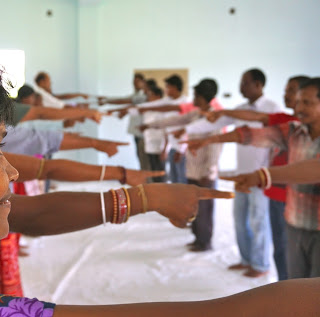In August, 2015, NJ explored the use of participatory theatre in the efforts to explore participatory ways of engaging with communities. The aim of using participatory theatre was to develop facilitation skills and deeper engagement with community members through tools from Forum theatre and Theatre of the Oppressed. The workshop was facilitated by Evan Hastings, a theatre artist and drama therapist who integrates Theatre of the Oppressed in his work. Communities we work with in Odisha use forms of song and dance as a medium of expression, and hence it was felt that beginning our exploration in the use of theatre tools would be most appropriate with facilitators of processes in these communities.
This workshop is part of the ongoing process in Odisha of developing a community protocol with communities in the context of mining, and building capacity within community members and facilitators of the process to use creative practices to engage the community in critical thinking and reflection about their interests and priorities, to listen to the complexity of multiple viewpoints, and enable dialogue. This training used music, movement and theatre to facilitate meaningful community interactions, while grounding the process in cultural practices that honor traditional ways of knowing.
The three day workshop explored concepts of breaking and unlearning habits, power dynamics, meta-analyses of reactions from activities, and facilitating dialogues to address issues. There was also focus on breaking the ritual was used to give meaning to archetypal conflicts in relation to struggles faced by the community. The participants also created forum scenes in small groups with impossible tasks and the audience (the other participants) worked on resolving what they saw as the issues/problems within the scene.
Sharing from the participants was highly positive, with everyone feeling that there had been a good amount of unlearning and relearning during the workshop. To quote from what one of the participants said, “I learned that the first step is to respect and understand the community. What is my role and responsibility in the context? As NGOs, we suggest solutions – the community has ideas on how to solve problems, we just have to facilitate it.” Many participants were keen on using some of the tools in the community and further building their skills.

